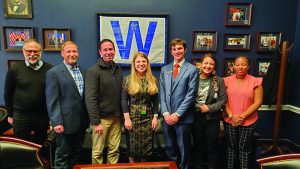R.F.D. NEWS & VIEWS: Illinois Soil Health bill goes national
By Tim Alexander for Chronicle Media — March 21, 2023
Ashley Lund (center), Legislative Aide for Rep. Raja Krishnamoorthi, met with a delegation of Illinois farmers and advocates of the food and farm system at Krishnamoorthi’s office in Washington, D.C. and announced the introduction of the Soil Health Resolution happening that day.
This week we have reports on decreasing fertilizer and diesel prices, updates on two key pesticide bills in front of the Illinois State Legislature and positive news regarding efforts by Illinois farmers to increase their environmental stewardship. Please read on …
Report: Fertilizer, diesel prices on the decline
URBANA — Prices farmers are paying for fertilizers and diesel fuel are declining at an appreciable rate, according to a report by agricultural news source DTN. DTN’s Russ Quinn reported earlier in March that retail fertilizer prices tracked by DTN for the last week of February 2023 continued to move lower. The trend had been in place for a couple months, according to Quinn.
“All eight of the major fertilizer prices are again lower compared to last month. Five of the eight fertilizers had a sizable price decline. DTN designates a significant move as anything 5 percent or more. Leading the way lower again was UAN28. The nitrogen fertilizer was 14 percent lower compared to last month and had an average price of $444/ton,” Quinn reported.
The not-so-good news: the DTN article concluded that as long as commodity prices stay strong fertilizer prices will follow suit, according to a fertilizer company economist. (DTN/ U of I farmdoc Farm Policy News)
Illinois Soil Health bill goes national
WASHINGTON, D.C. — A resolution that established a state Soil Health Day and Week is the model behind a new federal bill introduced on March 7 by Rep. Raja Krishnamoorthi. The Illinois Congressman introduced a resolution designating Dec. 5 as “National Soil Health Day” in recognition of the importance of the health of the nation’s soil to the economic and general well-being of Americans.
Krisnamoorthi’s House Resolution (HR) 210 is modeled after state legislation drafted by Illinois Stewardship Alliance’s farmer-led Soil Health Caucus. The Illinois Soil Health Week Act (HB3627) was introduced in January by Representative Charlie Meier and Agriculture Committee Chair Senator Doris Turner.
“The health of our soil is paramount for our food supply, our economy, and in our fight against climate change,” Krishnamoorthi said. “I’m proud to introduce this resolution to make Dec. 5 National Soil Health Day to promote the importance of protecting our soil and safeguarding it for generations to come.”
A National Soil Health Day has the potential to bring a diverse group of current and potential advocates together to not only celebrate but educate and raise the awareness of why protecting soil is important to human, environmental, and economic health, according to Liz Rupel, lead organizer of the Illinois Stewardship Alliance. (ISA news)
FFA water testing program returns
BLOOMINGTON — A successful water testing program that encourages FFA students to participate in water and soil conservation efforts is returning for a second year. Sponsored by Illinois Corn and the Illinois Soybean Association, the Water Testing Challenge offers Illinois FFA chapters the opportunity to learn, engage with farmers and win money for their chapter.
The contest, which runs through November, works like this: FFA chapters will develop and test hypotheses about nitrogen movement and potential loss from various production agricultural field settings. Students will be required to identify a minimum of three different locations with diverse water sources and management styles.
Students will then pick one (or more) of the locations tested and create a report explaining process, hypothesis and results. The report will also offer best management practice recommendations moving forward.
“Illinois Corn and Illinois Soybean Association are thrilled to have the opportunity to teach Illinois FFA students about the Illinois Nutrient Loss Reduction Strategy with this hands-on challenge. Learning how to identify possible problems and think through solutions will be invaluable for their future experiences. We’re excited to be able to offer this for a second year and donate to their chapters. We hope this program continues to grow annually,” said Megan Dwyer, Director of Conservation & Nutrient Stewardship for Illinois Corn, in a news release.
Interested FFA advisors and chapters should contact Dwyer to learn more about the Water Testing Challenge and to register.
Restricted Use Pesticide bill fails to be called
BLOOMINGTON — A recent Illinois Fertilizer and Chemical Association email updated members on the status of a number of farm chemical-related bills that are under consideration by the Illinois General Assembly. Among the bills: HB3800 (RESTRICTED USE PESTICIDES), which amends the Illinois Pesticide Act to classify products containing dicamba, a controversial herbicide, and 2,4-D type herbicides. The bill would amend the definition of “Restricted Use Pesticide” to also include any pesticide with one or more of its uses classified as restricted by order of the Director of the Illinois Department of Agriculture or any pesticide containing Dicamba (3,6-dichloro-2-methoxybenzoic acid) or 2,4-D (2,4-dichlorophenoxyacetic acid). HB3800, which is opposed by the IFCA, was not called in the House Environment Committee, the IFCA reported.
Relatedly, a bill that would amend the Illinois Pesticide Act to increase various fees imposed under the Act beginning in 2024, HB3086/SB1726 (PESTICIDES-REGISTRATION), was passed out of the House Environment Committee. SB1726, however, was not called in the Senate Ag Committee. The bill would also amend the Lawn Care Products Application and Notice Act to increase the lawn care containment permit fee to $250 (rather than $100). IFCA opposes the bill.
Illinois Farm Fact:
2.003 million: The number of U.S. farms, which is down 9,350 farms from 2021. The number of farms increased in all sales classes except the $1,000-$9,999 and $10,000-$99,999 sales classes. (USDA’s Farms and Land in Farms 2022 Summary)



